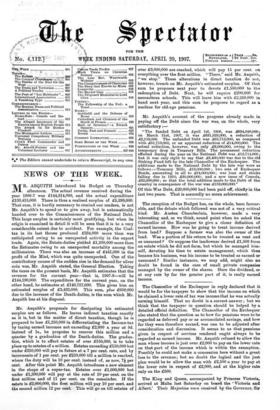Mr. Asquith's proposals for dissipating his estimated surplus are as
follows. He leaves indirect taxation exactly as it is, but in the matter of direct taxation, though he is prepared to lose £1,250,000 in differentiating the Income-tax by taxing earned incomes not exceeding £2,000 a year at 9d. instead of Is., he propotes to recover this million and a quarter by a graduation of the Death-duties. The gradua- tion, which is to affect estates of over 2150,000, is to take place up to estates of a million. Estates exceeding £150,000 but under 2250,000 will pay in future at a 7 per cent, rate, and by increments of 1 per cent. per 2250,000 till a million is reached, where the duty will be 10 per cent, instead of, as now, 7i per cent. After this point Mr. Asquith introduces a new element in the shape of a auper-tax. Estates over 21,000,000 but under 21,500,000 will pay at the rate of 10 per cent, on the first million and of 11 per cent. on the remainder. If the estate is 22,000,000, the first million will pay 10 per cent, and the second million 12 per cent. This will go on till estates of
over 23,000,000 are reached, which will pay 15 per cent, on everything over the first million. "There," said Mr. Asquith, "we stop." These alterations in direct taxation do not, however, trench on Mr. Asquith's estimated surplus. Of that sum be proposes next year to devote 21,500,000 to the redemption of Debt. Next, he will require 2200,000 for necessitous schools. This will leave him with £2,250,000 in hand next year, and this sum he proposes to regard as a nucleus for old-age pensions.










































